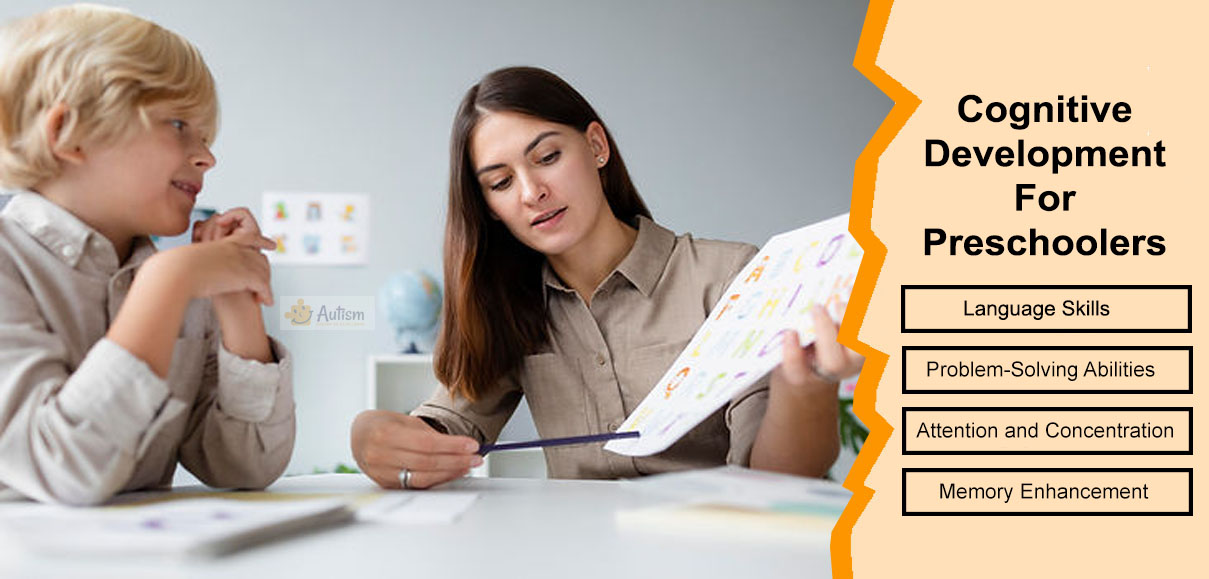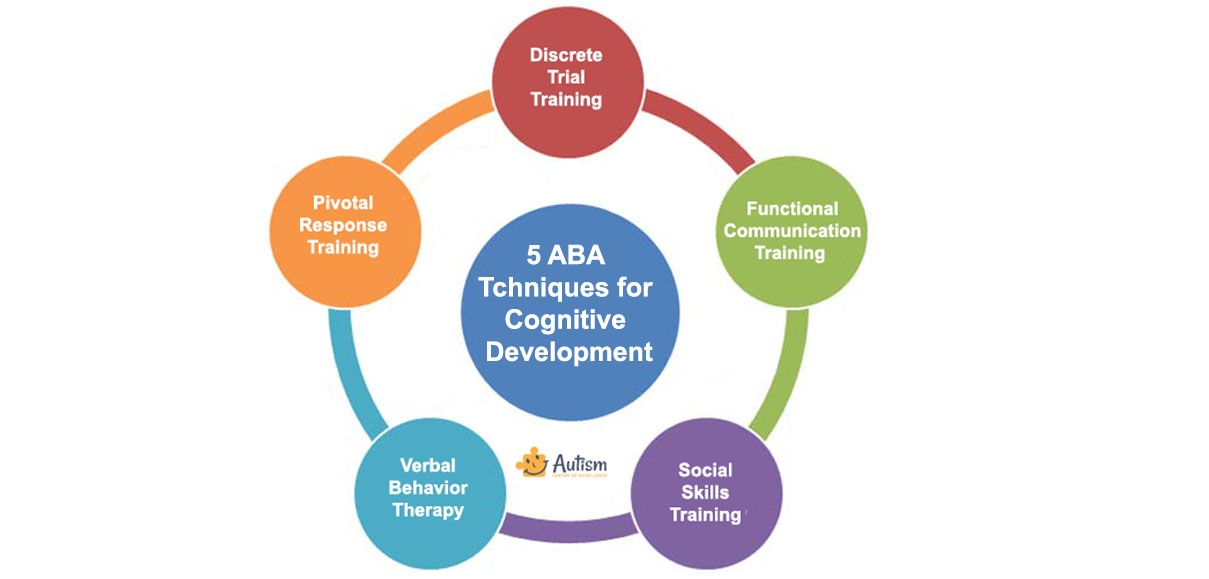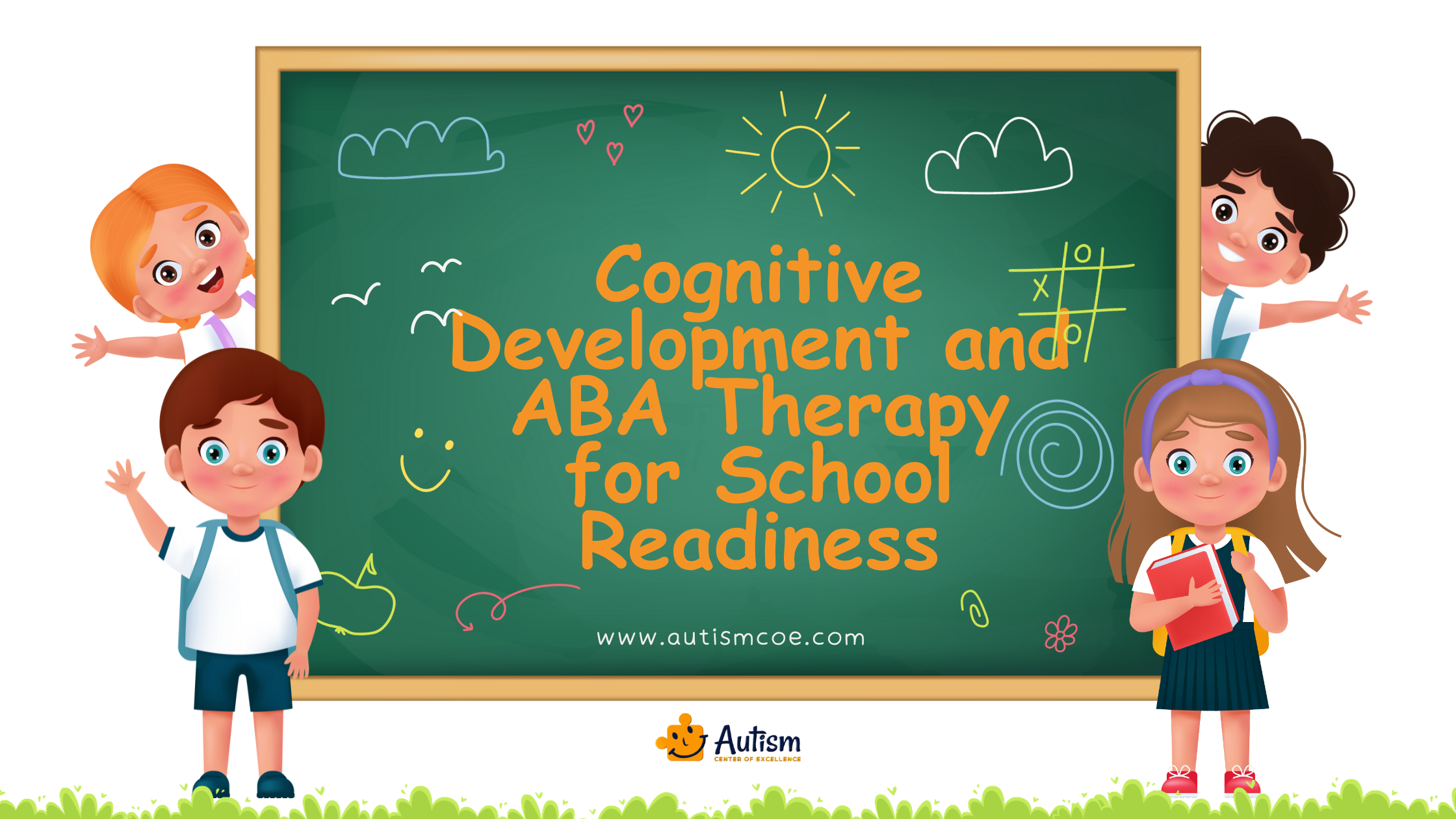In the domain of early childhood development, ensuring readiness of the young children for school becomes a core objective. Cognitive development is a key factor in this process, determining the ability of the child to learn, think, and solve problems. Applied Behavior Analysis (ABA) therapy, a scientifically proven method, provides help at the crossroads of cognitive development and school readiness. This is a thorough article and we will discuss the world of cognitive development and how ABA therapy helps in shaping young minds, supplying them with skills needed to succeed not only in school but also in life.
What is Cognitive Development in School Age Children?
Cognitive development in children during the school-age period which usually covers the age range from 6 to 12 involves the development of thinking, memory, and problem-solving skills. This time they enter Piaget’s concrete operational stage during which more logical reasoning and an appreciation of conservation occur. Their memory grows, supporting the learning process in the academic context, and language skills develop, fostering communication.
Suggested: Piaget’s Stages of Cognitive Development in Preschoolers with Autism
They develop higher skills in problem-solving, cause-and-effect relationships, and more advanced mathematical topics. Spatial thinking is enhanced, and critical for topics such as geometry. Sociocultural factors define the formation of their cognitive development and metacognition enables them to plan, monitor, and evaluate their learning strategies. Furthermore, they create a concept of mind, improving the perception of minds in other people. These cognitive markers set the stage for further academic and intellectual Development.
Important Cognitive Developmental Milestones
Cognitive developmental milestones are major accomplishments in an individual’s mental growth and capabilities as they move from one stage of life to another. These steps give some idea about the usual cognitive development of people. Here are some key cognitive developmental milestones at various stages:
1. Infancy (0-2 years):
Sensory experience and the development of motor coordination.
Creation of fundamental concepts, such as object permanence (knowing that objects still exist when they are not in view).
Early language comprehension and communication emergence.
2. Early Childhood (2-6 years):
Accelerated language acquisition including vocabulary amplification and sentence pattern.
Growth of creative play and symbolic thought.
Development of math understanding up to counting and very basic arithmetical operations.
Enhanced ability to concentrate and continue the focus on tasks.
3. Middle Childhood (6-12 years):
Thinking of concrete operations, which permits logical problem-solving.
Developments in memory and cognition.
Better reading and writing skills.
Elementary comprehension of scientific ideas and the natural world.
Improved social and emotional sensitivity.
4. Adolescence (12-18 years):
Growth of abstract thinking and sophisticated reasoning.
Deeper polishing of language and communication abilities.
Enhanced critical thinking and problem-solving skills.
Identity formation and searching for future objectives and dreams.
Higher level of social and ethical considerations.
The Role of Cognitive Development For Preschoolers

Cognitive development is essential to preschoolers who are usually around the age of 3 to 5 years as it sets the stage for future learning and intellectual expansion. During this stage, several key aspects of cognitive development are notable:
Language Skills for Preschoolers
The acquisition of language for Preschoolers is one of the main aspects of cognitive development. ABA therapy can assist children in improving their language skills; these skills are critical for effective communication and successful learning in a school setting. With the ABA approach, children can improve their vocabulary, grammar, and communication skills.
Problem-Solving Abilities
Cognitive development fosters the problem-solving capabilities of a classroom-based child. ABA therapy teaches children how to analyze situations, simplify them, and arrive at workable solutions. These skills are priceless not only in the classroom but in life as well.
Attention and Concentration
One of the critical elements in cognitive development is the skill to focus and concentration. ABA therapy helps children develop the right attention span necessary for absorbing information in class and for completing assignments precisely.
Memory Enhancement
Solid cognitive development is highly associated with memory retention and recall. Children can be helped in improving their memory with the ABA therapy strategies to remember important facts, ideas and information for their academic achievement.
Cognitive Developmental Challenges in Early Childhood
In this context, the cognitive development of preschoolers is a period of crucial development and learning. Several challenges can impact cognitive development during this stage:
Attainment of language is an important cognitive goal. Some children may experience some issues in the development of language skills hence communication and comprehension.
Social contact with both peers and adults is important for cognitive development. The cognitive abilities of children with little social life or problems with social contact are limited in some of these abilities.
Individual children might suffer from certain learning disabilities like dyslexia or ADHD that might influence their cognitive development. Early detection and intervention are important to overcome these issues.
The executive functions among others include impulse control skills, working memory, and cognitive flexibility. For children, mastering these skills can be tough and affect their capacity to plan, solve problems, and control their emotions.
How to Assess Cognitive Skills for School Age Children?
Evaluation of the cognitive abilities of children at school age is an important part of their social and intellectual development and educational needs. Various tools and methods are used to evaluate cognitive skills in this age group:
✅ Standardized Testing
Standardized tests are one of the most common tools to assess cognitive skills. They test the child’s skills in various fields like reading, mathematics, and language comprehension. Results give important data about a child’s readiness for grade academic level.
✅ Observational Assessment
Observational assessments are done by watching a child’s behavior and interactions. Professionals observe cognitive engagement, problem-solving skills, and socialization in different areas.
✅ Parent and Teacher Reports
Parent and teacher reports are a source of significant details about a child’s cognitive development, as they depict the minor observations and behavior that are crucial for the evaluation of academic progress and learning styles. These reports provide comprehensive records of both the school and the home perspectives.
✅ Neuropsychological Testing
Sometimes, neuropsychological testing should be performed to assess certain cognitive functions. This type of testing can identify cognitive difficulties and direct individualized interventions.
Tests of cognitive skills are continuous and are intended to direct educators and parents to the support necessary to promote the child’s success in school. Early detection of the areas that may demand improvement permits directed interventions and individualized learning plans.
Join Our Weekly Newsletters!
Subscribe now to stay updated with our latest email updates.
How to Enhance Cognitive Development in a Child?
With a strong knowledge of how ABA therapy helps with cognitive development and the assessment of cognitive skills, we will now look a bit more into ABA therapists’ methods and techniques used for the development of cognitive skills in children.

🚀 Discrete Trial Training (DTT) – DTT is a highly structured and systematic methodology that organizes complex skills into small but discrete components. It is the fact of taking clear instructions, practicing them repetitively, and using positive reinforcement methods. DTT At the same time, it is a powerful technique for boosting attention, memory, and language skills.
🚀 Pivotal Response Training (PRT) – PRT is a kind of naturalistic training that aims to encourage a child’s natural desire to play and learn. It promotes self-initiated behaviors and strengthens behavior flexibility and problem-solving as well.
🚀 Verbal Behavior Therapy (VBT) – VBT is a subset of ABA therapy and focuses on language and communication skills. Language learning functions to build expressive and receptive language skills, broadening the children’s understanding and expression of thoughts.
🚀 Social Skills Training – Social development is an aspect of cognitive development that relates to the capacity of an individual to interact with peers and acquaintances in a satisfactory manner. ABA trainer’s social skills training is used to teach children how to initiate a conversation, recognize social cues, and create friends.
🚀 Functional Communication Training (FCT) – FCT is training aimed at replacing undesirable behaviors with more acceptable communication strategies. This increases cognitive control and provides the children with creative ways to express themselves or their needs.
Such methods and tactics are crafted per the distinct individuality of every kid. Children will benefit from improved cognitive functions, which strongly increases the opportunity for successful completion of school tasks.
Also Read: 10 Best Cognitive Development Activities for Preschoolers with Autism
Frequently Asked Questions & Answer
Why Is Cognitive Development Important When It Comes to Getting Children Ready for School?
Cognitive development is reserved one of the most important roles in preparing children for school because it is the basis of their ability to think, learn, solve problems, and interact with others It not only provides them with the essential skills and mental processes but it is also the key aspect they need to get them ready for school.
How Does ABA Therapy Address Cognitive Challenges in School Readiness?
ABA therapy aims at improving cognitive abilities through therapeutic processes that are individualized for every child. It makes it easier to develop executive functions, attention, self-regulation, and other cognitive skills, helping children cope with difficulties and succeed in the educational setting.
How Can Parents and Educators Support Cognitive Development for School Readiness?
Parents and educators can foster cognitive development through knowledge of key milestones, execution of ABA techniques, and the formation of an environment that stimulates cognitive growth. Furthermore, using professional services, specialized organizations such as the AutismCOE, are very helpful.
What Are the Key Aspects of Cognitive Development that Play a Crucial Role in The Lives of Preschoolers?
Preschool cognitive development involves learning a language, solving problems, concentrating, and remembering more. These cognitive abilities serve as their base for further knowledge and intellectual development, fostering their respective communication skills, logical thinking, and academic competence.
Conclusion
In conclusion, a child’s cognitive development is a crucial School Readiness element for the kid’s ability to learn and succeed within the academic environment. ABA therapy provides with custom solutions focusing on cognitive capacities such as attention, memorization, and problem-solving. Conducting cognitive skill analysis enables delivering individualized assistance, seeing to it that children are ready for school. With ABA techniques, children can get a good start towards a prosperous future, and pave the way for growth and possibilities.
Please Note: The content of this blog is for informational purposes only and should not be considered a substitute for professional medical advice, diagnosis, or treatment. Consult a qualified healthcare professional for personalized guidance tailored to your specific situation.

Bhavika Bhasin
Bhavika Bhasin is the Research and Marketing officer at AutismCOE. She works with children and adults with ASD. Her clinical research includes evaluating various available autism screening and diagnosis methods and their efficacy. She is currently developing a novel screening exam that is indicated to be more accurate than the existing available exams. She is also writes articles papers for various publications.


